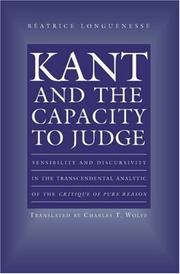| Listing 1 - 2 of 2 |
Sort by
|
Book
Year: 2010 Publisher: S.L. Steven J. Gelberg / Blurb
Abstract | Keywords | Export | Availability | Bookmark
 Loading...
Loading...Choose an application
- Reference Manager
- EndNote
- RefWorks (Direct export to RefWorks)
attraction --- conversion --- Indian religious tradition --- the West --- religious absolutism --- self-alienation --- ideology --- women --- sex --- children --- Evangelistic ethics --- abuse of power --- the transcendental ideal --- the guru --- infallible knowledge --- testimony

ISBN: 0691074518 0691043485 0691214123 Year: 1998 Publisher: Princeton, N.J. : Princeton University Press,
Abstract | Keywords | Export | Availability | Bookmark
 Loading...
Loading...Choose an application
- Reference Manager
- EndNote
- RefWorks (Direct export to RefWorks)
Kant claims to have established his table of categories or "pure concepts of the understanding" according to the "guiding thread" provided by logical forms of judgment. By drawing extensively on Kant's logical writings, Be;atrice Longuenesse analyzes this controversial claim, and then follows the thread through its continuation in the transcendental deduction of the categories, the transcendental schemata, and the principles of pure understanding. The result is a systematic, persuasive new interpretation of the 'Critique of Pure Reason'.Longuenesse shows that although Kant adopts his inventory of the forms of judgment from logic textbooks of his time, he is nevertheless original in selecting just those forms he holds to be indispensable to our ability to relate representations to objects. Kant gives formal representation to this relation between conceptual thought and its objects by introducing the term "x" into his analysis of logical forms to stand for the object that is "thought under" the concepts that are combined in judgment. This "x" plays no role in Kant's forms of logical inference, but instead plays a role in clarifying the relation between logical forms (forms of concept subordination) and combinations ("syntheses") of perceptual data, necessary for empirical cognition.Considering Kant's logical forms of judgment thus helps illuminate crucial aspects of the Transcendental Analytic as a whole, while revealing the systematic unity between Kant's theory of judgment in the first Critique and his analysis of "merely reflective" (aesthetic and teleological) judgments in the third Critique.
Kant, Immanuel --- Contributions in doctrine of judgment --- Judgment --- Judgement --- Knowledge, Theory of --- Language and languages --- Psychology --- Thought and thinking --- Wisdom --- Kant, Immanuel, --- Judgment. --- Jugement (logique) --- Jugement (Logique) --- Kant, Immanuel (1724-1804). --- Et la theorie de la connaissance. --- Et la logique. --- Et le jugement. --- Contributions in doctrine of judgment. --- Kritik der reinen Vernunft (Kant, Immanuel) --- Critik der reinen Vernunft (Kant, Immanuel) --- Immanuel Kant's Kritik der reinen Vernunft (Kant, Immanuel) --- Aristotle. --- Bennett, Jonathan. --- Critique of Judgment. --- Hume, David. --- Leibniz. --- Locke. --- Schematism. --- alteration. --- apperception. --- cause and effect. --- construction. --- essence. --- experience. --- geometry. --- guiding thread. --- imagination. --- intuition. --- mathematics. --- nothing. --- number. --- ontology. --- perception. --- quanta continua. --- reality. --- reflection. --- rule. --- schema. --- sensation. --- synthesis. --- transcendental ideal. --- world.
| Listing 1 - 2 of 2 |
Sort by
|

 Search
Search Feedback
Feedback About UniCat
About UniCat  Help
Help News
News